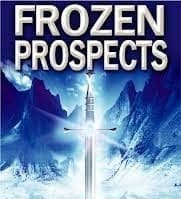Where Does the Art Change Hands?
by Cynthi Marie
 Reading through the newest issue of Gameinformer, which I’m new to, reawakened thoughts on varies topics I’ve had floating around in my head for months now, all of them centered around independent creation. I touched briefly on one of these issues in my post about Face Off, but others hadn’t come together cohesively enough to warrant a blog posting. A few of the interviews and articles in this gamers magazine helped focus some of these thoughts, as well as help me remember why keeping up my steady diet of reading is so good for me. I often put aside reading other people’s work to open more time for my own creations. Apparently, others’ words can help focus ones own…
Reading through the newest issue of Gameinformer, which I’m new to, reawakened thoughts on varies topics I’ve had floating around in my head for months now, all of them centered around independent creation. I touched briefly on one of these issues in my post about Face Off, but others hadn’t come together cohesively enough to warrant a blog posting. A few of the interviews and articles in this gamers magazine helped focus some of these thoughts, as well as help me remember why keeping up my steady diet of reading is so good for me. I often put aside reading other people’s work to open more time for my own creations. Apparently, others’ words can help focus ones own…
There was a question raised about consumer demands/opinions/expectations versus artistic vision. Possibly the same idea is raised in The People vs George Lucas (which I haven’t yet seen, though it is in my Netflix queue), as I believe this documentary reflects this same idea: Do the fans become more powerful to the progression of an art form over the creator? They are the ones, ultimately, who are footing the bill. Maybe it’s not even fully an economic question, but simply about creating something for others, making those others the sole focus of the endeavor. I began writing for me, with no thought to sending my words out to the world. Now that I’ve decided to step over this public threshold, the stakes have changed slightly, in that I must consider, to varying levels, demographics. What do people expect when they engage in an art medium? Granted, the answer varies slightly from art form to art form, then from genre to genre, but overall, how is this gauged, and to what level should the artist consider these questions? What price tag should be put to these things? Everyone would love to make $100 an hour for their time, but should this be what is charged for a work? On the other hand, everyone wants everything for nothing, so where is the middle ground? Should price be fair, or should it be simply be the price someone is willing to pay. In this case, highest bidder wins. At the same time, it would be great to offer work for free, but it costs to live, thereby costing to create, and any artist wants to be able to quit their day job to focus completely on their work.
There is typically a wide variance in price points between established artists, and no-name beginners, even at equal quality of work. Establishment, typically, does get a higher return, and often, rightly so. If I read a book I like, I’m going to assume another book by the same author is going to be as good, so be more likely to shell out my money to purchase it. Someone I’ve never heard of, I may not be willing to put out as much money for. I’m usually willing to spend up to $5 on a book I have no idea about, versus $10-15 on a book I’m more sure about (these are e-books I’m talking about. I pay the hard cover price for the books I know I’ll want in my physical library. Since my Kindle, I rarely buy trades). The growing business of e-publishing is great, giving artists a chance to show their work where they may not have been able to do so before. Yet, at the same time, there is a lot of mediocre work out there, because anyone can, fairly easily, submit their work to the world. As I say this, I wonder if this is actually true. Is there really more mediocrity out there now than before? I watch movies, and TV, and read all kinds of books, created at all levels of production value. There’s been many times I’ve wondered why huge amounts of money were put towards endeavors I found ridiculous, and just BAD, where other projects I thought truly great didn’t get any attention. Why did such-and-such an author get picked up by an agent when other guy, whose work is arguable just as good, didn’t. Perspective, and relativity, play huge roles in the success of any art. From the perspective of this statement, there’s a market for everything.
Mass Effect 3, a game I’ve only just gotten into, though I pre-ordered it back at Christmas, is the last in a series of games that are fantastic! Reading A Fight
For the Finish, by Joe Juba in GameInformer(page 25), made me frown, then smile, then rant. The end of this game apparently left fans “discontented.” What I gather is that too many questions were left unanswered. Not having finished the game yet, I can’t sound in on this, but I do tend to be forgiving when it comes to these types of issues. It’s hard to finalize something, especially something like this that has so many fans who’ve waited quite a while for this final stage in the saga. It’s like at the end of a movie when they finally show you the monster. It’s usually disappointing, because even if we didn’t have a clear picture of what this thing would look like, it wasn’t what was portrayed on-screen. And how could it be? Of the infinite options creators have, forced to constrain themselves to a budget and schedule, etc, what should these things be? I always say, don’t show me the thing, which many won’t agree with, continuing the string of disappointment. Personally, I feel most people, especially Americans, have totally skewed expectations of what is given them, on all levels, including art, whether it be film, books, music, etc. Yet, as creators, these opinions should be accounted for. With the amount of feedback BioWare received about Mass Effects ending, the CEO posted “…Mass Effect has been a shared experience between the development team and our fans…not just…in playing… but in designing and developing…” It seems safe to say that BioWare will let the fans dictate the creation of their art, and will be issuing changes to the ending. I’m torn on how I feel about this.
When I was still young enough to be idealistic, selling out was a concept that often came up when talking about bands signing with major labels, and other similar corporately run contracts. Now, I feel there’s a fine line to find. Without these money hounds, what’s the likely hood your art will get out there? If you’re smart, you’ll make money and save it to be able to finance your own endeavors without these mafia giants. Is the argument valid from the other side? Should your fans, who’ve supported you and granted you the success you’ve made, be ignored? Is creating art a purely selfish endeavor? Should it be? Or is it a shared medium?
By Cynthi Marie
Check out the original post here : http://stealingshade.wordpress.com/
My first, and greatest love was always books, which turned into writing early on. Then came movies. Games didn’t enter my life until PS2 came out. I tend to stay away from games as they suck my world into oblivion. I stop sleeping. I stop paying attention to everything else when I get into them, though I break this for Mass Effect, Assassins Creed, Gears, and FF. Recently entering the amateur indie film scene, Stealing Shade Productions (stealingshade.com) was born. I’m also working on a comic book (stealingshade.indieaisle.com) and 2 novels. There are bets on whether these will get finished Find me on Facebook @facebook.com/StealingShadeProductions or check out my alter ego at shutthehealthup.wordpress.com.































